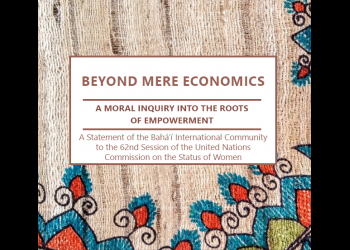Beyond Mere Economics: A Baha’i Contribution to the Commission on the Status of Women
Despite numerous barriers to progress and equality, rural women are earnestly engaged in the advancement of communities around the world. Experience has shown that key to this engagement is a focus on strengthening individual and collective capacity which "must concern itself with all aspects of human existence--economic as well as social, intellectual, cultural, spiritual, and moral."
So says a statement of the Baha'i International Community to the 62nd Commission on the Status of Women, taking place from 12-23 March 2018. The priority theme for the Commission is "Challenges and opportunities in achieving gender equality and the empowerment of rural women and girls."
The statement, which was drafted by drawing upon the insights of a number of rural women around the world, goes on to address “countless barriers to women and girls assuming their rightful place in society.” Preeminent among them, it says, is “a refusal to embrace the reality that women and men are equal.”
Ultimately, it suggests, facilitating change requires the active participation of both women and men: “...Decades of experience have shown that when growing numbers of women and men, young and old, of all economic and educational backgrounds, work together to learn about patterns of relationships and corresponding social structures that reflect the fundamental oneness of the human family, real change is possible.”
The statement further asserts that educational systems should be remodeled to assist in greater capacity building, developing “capabilities for service to the community and society.” As these qualities are cultivated and advanced, an individual’s role in society in relation to the progress of others becomes a powerful influence in motivation towards action. “For women in rural areas, it has often fueled a growing sense of being a capable and empowered contributor to the common good,” the statement says. Moreover, the empowerment that forms as a result of women building better communities enables them to become more visible, challenging pre-existing gender dichotomies, and to “rethink inherited assumptions about social patterns and the roles played by women and men.”
Integral to the process is the role of young people. In many Bahá'í communities around the world, youth are transcending the cultural assumptions pertaining to gender roles, engaging in service and reshaping rigid perceptions. The statement refers to the experience of a youth group in Uganda convening a series of community discussions on the importance of educating the girl child.
The statement also calls on Member States to provide for the advancement of women and girls through a variety of means--including just laws, equitable service provision, and the promotion of artistic and cultural expression--to continue to advocate for the unalienable rights of all human beings.
The full statement can be read here.
